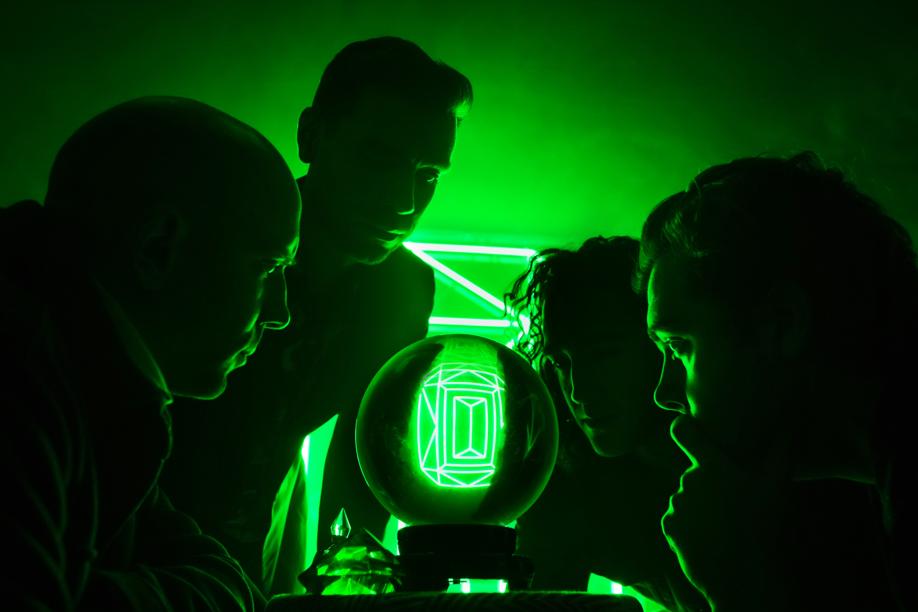
Ben Schneider, who provides much of the wanderlust underlying Los Angeles-based indie-folk group Lord Huron, has a deeply ingrained, near-mystical sense of America’s hidden wilderness, the winding rivers and rugged crags waiting just beyond the cityscape’s electric bustle.
His arrangements, with their reverberating acoustics and soft polyrhythms, often evoke bygone Appalachia; his lyrics are mournfully Arcadian in a way that evokes Thoreau. Even on Lord Huron’s more experimental, bass-heavy third disc, “Vide Noir’’ — which brings the group to Boston for a sold-out House of Blues stop Monday — the sensation persists that Schneider and his loyal bandmates feel most at ease in nature, communing with more elemental energies than those used to power the sprawling metropolis they call home.
So it’s fitting that, when the frontman picks up his phone, he’s out for a midday stroll in the picturesque Verdugo foothills, exploring a route not far from his current Glendale lodgings.
“This is the one time of year when it’s green here, really green and beautiful,’’ says Schneider, 33, as he takes in the view. Below, a freeway snakes through the landscape; this range is surrounded on all sides by urban development. It exists as a sanctum of sorts for local hikers and wanderers, like him.
Sights like these, the balance of human activity and neighboring nature, informed the sound of “Vide Noir,’’ he says. It was night drives through the interconnected landscapes of LA that first led the musician to conceptualize a record that could emerge beneath twinkling city lights and follow concrete pathways out into the wild, ultimately transcending earthbound vistas to begin a cosmic quest for truth and purpose.
“We’re still exploring the same themes of the big questions of the universe,’’ explains Schneider. Lord Huron’s past records, “Lonesome Dreams’’ (2012) and “Strange Trails’’ (2015), both colored their folksy tableaus with existential conflict, their songs appearing almost dreamlike in their consideration of lost love and uncertain fate.
“This time, it’s set in a little more of a neon-lit, somewhat urban space,’’ he says. “But it’s interesting how those things apply no matter where you are, whether it’s the dusty frontier or a neon city street.’’
Often, the songs strive to make sense of it all by viewing what Schneider calls “incomprehensible truths about the universe’’ through the prism of two deeply humanist subjects.
“If you really look at even most pop music, it all comes down to that, really: love, and probably death,’’ he says. “Those are the big things that people have to think about as humans, you know? What do we do with our time here, and how do you define our time beyond us being here? Those two questions preoccupy us forever, and with good reason. You can never truly know the answer.’’
The title, from the French “black void,’’ came to Schneider as he developed an increasingly cinematic vision for the album.
“The things science teaches us about the universe can sometimes seem cold and removed to people,’’ says Schneider. “But I think there’s another side to it too, where there’s a beauty to this emptiness, this void that’s out there. I started thinking about the city in that way too, how it’s this place that can suck you in and trap you, but you can also think of it as this endless galaxy of possibility at the same time.’’
To achieve a more unmoored, extraterrestrial sound for the album, Lord Huron collaborated with Dave Fridmann, selected based on the strengths of his work with Tame Impala and The Flaming Lips, to help mix the album. Sonically, “Vide Noir’’ is infused with electronic, distorted effects and bass instrumentation, and the music’s drum parts were beefed up considerably, a progression that Mark Barry — on drums and percussion — greeted eagerly.
“This album definitely has a little bit more of a heavier feel, a punchy feel,’’ says Barry, 34. “It also has some swing to it. I feel like it’s more open and free for us.’’
Speaking briefly by phone, Barry adds that “Vide Noir’’ created opportunities to work with more live musicians in the studio, among them harpists, horn players, and a string section. Though Schneider is the main creative visionary for the band’s sound, the drummer says recording is always a collaborative process for Lord Huron, all four members putting their heads together to flesh out whatever world they’re creating.
“It starts with Ben presenting a vision, and then all of us snowball off that,’’ he says. “We talk about different ways to perform, pulling in different references, pulling in these different things from different aspects of our lives that then make itself known in the world, in a way.’’
“Vide Noir’’ feels like a significant step forward for the band, according to both Barry and Schneider, who says, “I don’t know if we’ve ever felt quite so fired up about new stuff we’ve made.’’
Before refocusing on his hike, Schneider concludes it may be a matter of Lord Huron locating some truth in its celestial wanderings, and deriving fresh purpose from its heady new sound.
“I think there are certain colors that we’ve never had on previous records which I’ve always been interested in,’’ he says. “There’s this darkness that’s colorful that I don’t think we’ve seen before. It’s kind of hard to say it exactly. But I think, with this album, we’ve expanded our colors.’’
Isaac Feldberg can be reached by email at isaac.feldberg@globe.com, or on Twitter at @isaacfeldberg.



